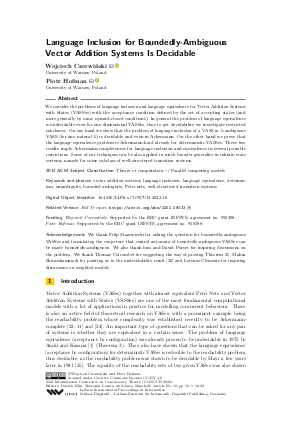@InProceedings{czerwinski_et_al:LIPIcs.CONCUR.2022.16,
author = {Czerwi\'{n}ski, Wojciech and Hofman, Piotr},
title = {{Language Inclusion for Boundedly-Ambiguous Vector Addition Systems Is Decidable}},
booktitle = {33rd International Conference on Concurrency Theory (CONCUR 2022)},
pages = {16:1--16:22},
series = {Leibniz International Proceedings in Informatics (LIPIcs)},
ISBN = {978-3-95977-246-4},
ISSN = {1868-8969},
year = {2022},
volume = {243},
editor = {Klin, Bartek and Lasota, S{\l}awomir and Muscholl, Anca},
publisher = {Schloss Dagstuhl -- Leibniz-Zentrum f{\"u}r Informatik},
address = {Dagstuhl, Germany},
URL = {https://drops.dagstuhl.de/entities/document/10.4230/LIPIcs.CONCUR.2022.16},
URN = {urn:nbn:de:0030-drops-170796},
doi = {10.4230/LIPIcs.CONCUR.2022.16},
annote = {Keywords: vector addition systems, language inclusion, language equivalence, determinism, unambiguity, bounded ambiguity, Petri nets, well-structured transition systems}
}

 Creative Commons Attribution 4.0 International license
Creative Commons Attribution 4.0 International license





























